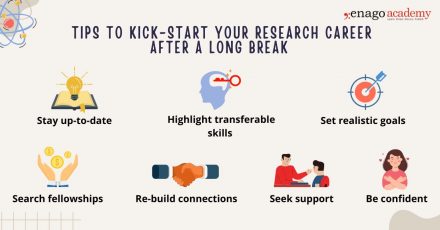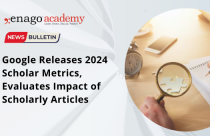Reviving Your Research Career: Overcoming the roadblocks of resuming research after a long gap

It could be a family emergency, a desire to try out a new career path — write a book or develop an app, or just need a break from the daily grind to work on yourself. There are many reasons to why you might need to take a considerable break from your research career. So, if you are planning to take one or have already taken one and are worried about how to get back after this gap, which often harbors stigma amongst researchers, you are not alone!
It’s normal to feel a bit rusty and overwhelmed after a break. It can be tough to pick up where you left off, especially when it comes to research. But it isn’t impossible to get back to the grind like you never left!
One such success story of Dr. Maryam Mirzakhani, a mathematician who took a break from research to care for her daughter, is an inspiring example. She returned to academia two years later and continued to make groundbreaking contributions in the field of mathematics. In 2014, she became the first woman to receive the Fields Medal, one of the highest honors in mathematics. Just like Dr. Mirzakhani you can also strike back and resume your research career with the same resilience and zeal. Wonder how? Read on, as we explore the benefits and challenges of a sabbatical or research career break, discuss why it’s important to prepare for a return to work, and share actionable tips for reentering the workforce after a long absence. From finding your focus to staying motivated, let’s cover everything you need to know to get back into the swing of things and start making progress.
Benefits of sabbaticals or long breaks from your research career
A sabbatical or a extended break from your research career is more prominent in academia as compared to other professions. It is a period where an individual takes a break from their regular work routine, usually with pay, to pursue personal or professional development. It can last from a few months to a year and is typically granted after a certain number of years of service but typically.
Research is a critical component of career advancement and is often a requirement for tenure, promotions, and grants. Hence, you may find the need to take sabbaticals or long breaks from your routine to upskill yourself and pursue specialized training, engage in research collaborations outside your organization, or conduct fieldwork. In addition, you may also take extended leaves from research due to personal reasons such as medical conditions, family responsibilities, or personal development.
There is no doubt that sabbaticals and other forms of leaves can provide you with the time and resources to recover from an illness, care for a family member, or pursue personal interests or hobbies. It also provides a chance to reflect on your career goals and make plans for the future. You can make use of this opportunity to engage in professional development and deepen the knowledge and expertise in your field. This can include attending conferences, taking courses or workshops, or conducting research. In other words, it is a time for intellectual growth and renewal.
Combating social stigma and challenges in research after a career break
Carving out an academic career can be a challenging path to take. However, resuming it after taking a break, whether it be a sabbatical or an extended period away from academia, can be an even more formidable challenge. Unfortunately, it can also be accompanied by social stigma and challenges such as:
Ageism: One of the most common stigmas associated with returning to an academic career is ageism. Individuals who have taken a break may be perceived as too old to keep up with the demands of academic work or research.
Skill gap: Depending on the length of the break, you can miss out on new developments or technologies in your field, which can make it difficult to stay up-to-date with the latest research and techniques. This may pose challenges in conducting research after your return to academia. You can also miss out the opportunities for professional development, such as attending conferences or workshops, which can lead to a perceived lack of skills and knowledge.
Perception of commitment: Some employers or colleagues may perceive a gap in your career as a lack of commitment or dedication to the profession. Additionally, they may view a gap as a lack of continuous professional development, which is essential in many fields.
Difficulty in re-entry: You may find it challenging to re-enter the academic world and establish new connections and collaborations after a long break, especially if you had been completely out of touch with your professional network.
Financial challenges: Returning to academia after a break can sometimes mean taking a pay cut or starting at a lower position, which can pose financial difficulties. Taking a career break may impact your future employment, salary, and promotion opportunities. The perceived skill gap may make it more challenging to secure funding, publish papers, or compete for academic positions.
Tips to kick-start your research career after a long break
Considering the challenges you may face, it can be a daunting experience to come back to academia after being away for a while. But fear not! There are ways to overcome the roadblocks and get back on track. By taking the following steps, you can turn potential drawbacks into opportunities and demonstrate your value and commitment to the profession.

1. Stay up-to-date with the latest research and technology: Keep yourself engaged with the academic community during the break. This can be done by attending conferences, workshops, or seminars. Another option is to engage in online forums or discussion groups where academics share information and discuss the latest research.
2. Highlight transferable skills: Focus on the skills and experiences gained during the break that are transferable to your current role. This will help demonstrate your potential value to the academic institution and can help bridge any perceived gaps in your academic career.
3. Set goals to rebuild research productivity: It’s important to set clear goals and develop a plan to achieve them. Start with small projects or collaborations to regain momentum and gradually build up to larger projects. It’s also essential to establish a clear plan for managing work-life balance. This can include setting boundaries around work hours, scheduling dedicated time for personal obligations, and seeking out support from colleagues, family members, or professional organizations when necessary.
4. Look for career re-entry fellowships: There are many fellowships and grants designed to help you resume your research after a break. The Wellcome Trust’s Research Career Re-entry Fellowship and Daphne Jackson Fellowships are among the popular schemes which you can explore.
5. Re-establish connections: Reconnect with professional contacts, attend networking events, and build new connections in the academic world to demonstrate your commitment to the profession.
6. Seek support: Consider seeking out a mentor or joining a support group for individuals who have taken a break from academia. This can provide valuable guidance and support during the transition.
7. Be confident: Approach the return to academia with confidence. Highlight the skills, experiences, and knowledge gained during the break and focus on how they can be applied to current and future roles.
Hence, if you consider what you want and plan carefully, with the right support and strategies, it is possible to overcome the challenges and make valuable contributions to the field. Don’t let a gap year hold you back from reaching your research potential. So buckle up and get ready to reignite your passion for research!
Have you ever taken a sabbatical? Or have you taken some time off to simply enjoy a break and to rediscover yourself? Let us know the challenges you faced and the strategies you followed to overcome them in the comments section below! Also, feel free to reach out to us at any stage of your research or publication by using #AskEnago and tagging @EnagoAcademy on Twitter, Facebook, and Quora. Till then, keep researching!









![What is Academic Integrity and How to Uphold it [FREE CHECKLIST]](https://www.enago.com/academy/wp-content/uploads/2024/05/FeatureImages-73.png)